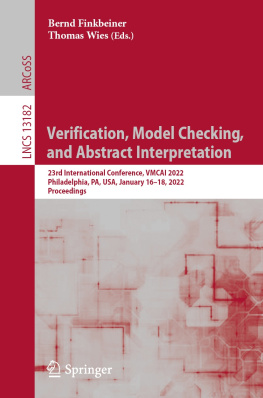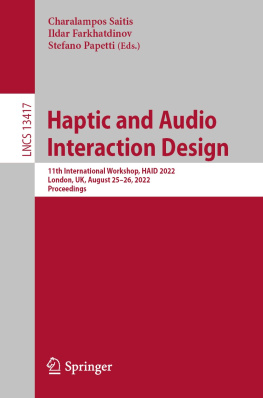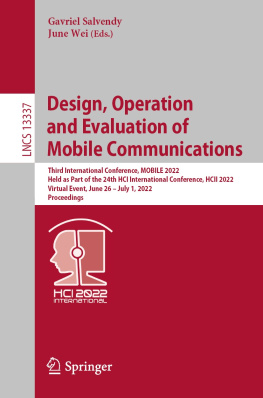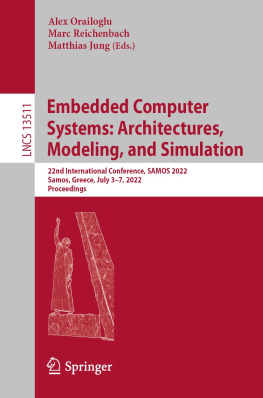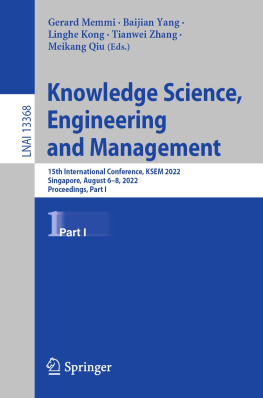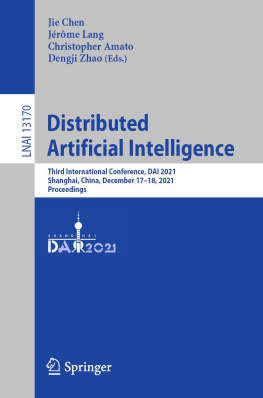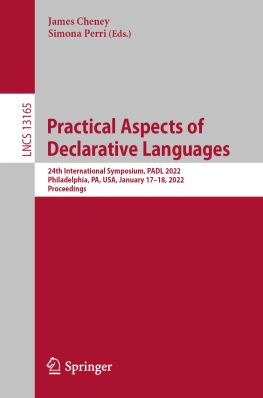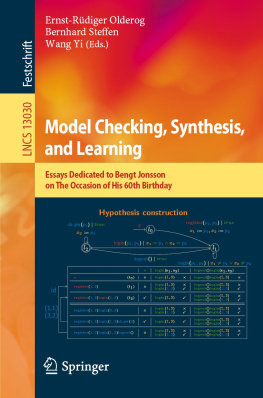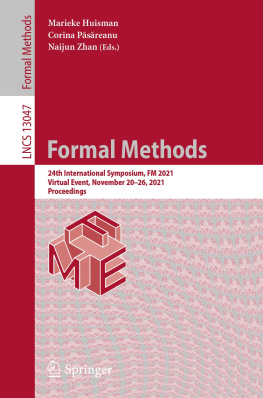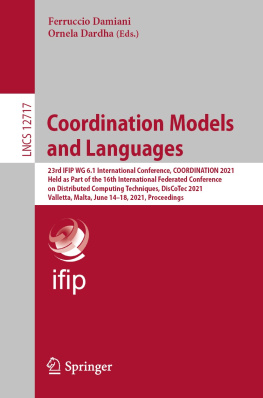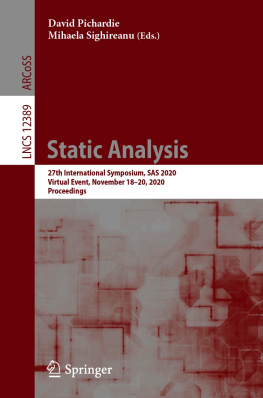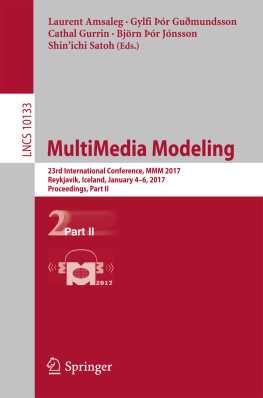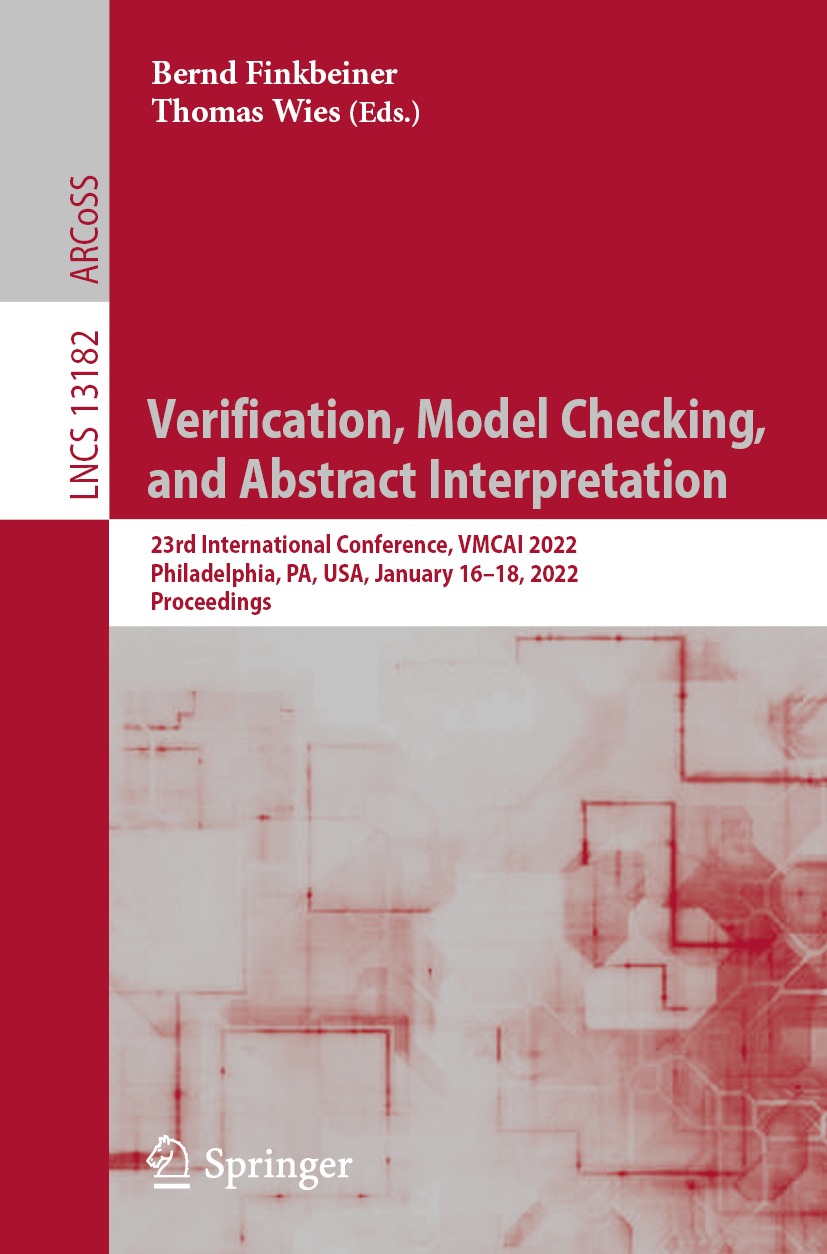Editors
Bernd Finkbeiner
Helmholtz Center for Information Security, Saarbrcken, Germany
Thomas Wies
New York University, New York, NY, USA
ISSN 0302-9743 e-ISSN 1611-3349
Lecture Notes in Computer Science Theoretical Computer Science and General Issues
ISBN 978-3-030-94582-4 e-ISBN 978-3-030-94583-1
https://doi.org/10.1007/978-3-030-94583-1
Springer Nature Switzerland AG 2022
This work is subject to copyright. All rights are reserved by the Publisher, whether the whole or part of the material is concerned, specifically the rights of translation, reprinting, reuse of illustrations, recitation, broadcasting, reproduction on microfilms or in any other physical way, and transmission or information storage and retrieval, electronic adaptation, computer software, or by similar or dissimilar methodology now known or hereafter developed.
The use of general descriptive names, registered names, trademarks, service marks, etc. in this publication does not imply, even in the absence of a specific statement, that such names are exempt from the relevant protective laws and regulations and therefore free for general use.
The publisher, the authors and the editors are safe to assume that the advice and information in this book are believed to be true and accurate at the date of publication. Neither the publisher nor the authors or the editors give a warranty, expressed or implied, with respect to the material contained herein or for any errors or omissions that may have been made. The publisher remains neutral with regard to jurisdictional claims in published maps and institutional affiliations.
This Springer imprint is published by the registered company Springer Nature Switzerland AG
The registered company address is: Gewerbestrasse 11, 6330 Cham, Switzerland
Preface
Welcome to VMCAI 2022, the 23rd International Conference on Verification, Model Checking, and Abstract Interpretation. VMCAI 2022 was part of the 49th ACM SIGPLAN Symposium on Principles of Programming Languages (POPL 2022), held at The Westin Philadelphia, USA, during January 1622, 2022.
VMCAI provides a forum for researchers from the communities of verification, model checking, and abstract interpretation, facilitating interaction, cross-fertilization, and advancement of hybrid methods that combine these and related areas. The topics of the conference include program verification, model checking, abstract interpretation, program synthesis, static analysis, type systems, deductive methods, decision procedures, theorem proving, program certification, debugging techniques, program transformation, optimization, and hybrid and cyber-physical systems.
VMCAI 2022 received a total of 63 paper submissions. After a rigorous review process, with each paper reviewed by at least three Program Committee (PC) members, followed by an online discussion, the PC accepted 23 papers for publication in the proceedings and presentation at the conference. The main selection criteria were quality, relevance, and originality.
The conference program included three keynotes: Iil Dillig (University of Texas, Austin, USA) on Computer-Aided Programming Across the Software Stack, Javier Esparza (Technical University of Munich, Germany) on Back to the Future: A Fresh Look at Linear Temporal Logic, and Thomas A. Henzinger (Institute of Science and Technology Austria) on Sequential Information Flow.
VMCAI 2022 continued the artifact evaluation process established by VMCAI 2020. The goals of artifact evaluation are as follows: (1) to encourage the development of tools that allow for replication of results in the paper, (2) to encourage reuse of tools by others in the community, and (3) to reward authors who spend the extra effort to create stable, portable, and usable artifacts. Artifacts are any additional material that substantiates the claims made in the paper. Examples of artifacts are software, tools, frameworks, data sets, test suites, and machine-checkable proofs. Authors of submitted papers were encouraged to submit an artifact to the VMCAI 2022 artifact evaluation committee (AEC). We also encouraged the authors to make their artifacts publicly and permanently available. Artifacts had to be provided as .zip or .tar.gz files and had to contain all necessary software for artifact evaluation as well as a README file describing the artifact and providing instructions on how to replicate the results. Artifacts were required to run in a virtual machine to ensure consistency of reproduction across the reviewing process.
All submitted artifacts were evaluated in parallel with the papers. We assigned three members of the AEC to each artifact and assessed it in two phases. First, the reviewers tested whether the artifacts were working, e.g., there were no corrupted or missing files and the evaluation did not crash on simple examples. For those artifacts that did not work, we sent the issues to the authors. The authors answers to the reviewers were distributed among the reviewers, and the authors were allowed to submit an updated artifact to fix issues found during the test phase. In the second phase, the assessment phase, the reviewers aimed at reproducing any experiments or activities and evaluated the artifact based on the following questions:
Is the artifact consistent with the paper and the claims made by the paper?
Are the results of the paper replicable through the artifact?
Is the artifact well documented?
Is the artifact easy to use?
In a change from the VMCAI Artifact Evaluation in 2021, this year we moved to a simplified badge model where a single badge was awarded for all passing artifacts. Of the 23 accepted papers, there were 16 submitted artifacts with 15 that passed the second phase and were thus awarded the Artifact Evaluation Badge.
We would like to thank, first of all, the authors for submitting their papers to VMCAI 2022. The PC and the AEC did a great job of reviewing: they contributed informed and detailed reports, and took part in the discussions during the virtual PC meeting. We warmly thank the keynote speakers for their participation and contributions. We also thank the general chair of the POPL 2022 week, Rajeev Alur, and his team for the overall organization. We thank the publication team at Springer for their support, and EasyChair for providing an excellent review system. Special thanks goes to the VMCAI Steering Committee for their helpful advice, assistance, and support.

